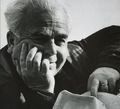He studied painting at the "School of Arts" (later Athens School of Fine Arts) from 1921 to 1926. He was among the students who struggled for the reorganization of the School and who attended the studio of the newly elected professor, Nikos Lytras.
From 1926, he begins to publish sketches and caricatures in newspapers. In 1929, he launches his first solo exhibition (Stratigopoulou gallery), joins the Greek Artists Association and undertakes his first stage design project, under the encouragement of Fotos Politis. In the coming years, he will continue with stage design, costumes and artistic direction of about 140 plays.
In 1930 he participates in the reestablishment of the art group Techni and wins an award by the Academy of Athens for the icon painting models of the church of St. Dionysius. Funded by this award, he was able to travel to Europe and study the work of great painters.
During the Occupation years (1941-1945) his printmaking work will become the trademark of the art of the Resistance. Apart from illegal printouts, he illustrates poetic and literary texts, and publishes manuscripts and numerous lithographs.
After the Greek Civil War he becomes a member of the group Stathmi (1949) and he is closely related to the intelligentsia of the '30s and to personalities from across the entire artistic spectrum.
His paintings (landscapes, portraits, everyday scenes and compositions with intensely Hellenic style), record characteristic aspects of contemporary Greek life in a picturesque and vivid way, sometimes inspired by folklore forms and sometimes by European standards. His poetic and at the same time familiar style, with subtle loans from surrealism or pop art, became very popular.
His prolific activity included teaching in various schools, as well as significant partnerships with public and private cultural organizations. In 1960 he is awarded the Guggenheim prize by AICA Hellas. In 1969 he publishes his autobiographical album Lights and Shadows and in 1972 he begins running the Mantrotichos project in his summer house in Eretria, with interesting artistic events.
He presented his work in numerous solo and group exhibitions in Greece and abroad. He participated in the Venice Biennale (1964) and in other international events. Two retrospective exhibitions were organized at the Athens National Art Gallery (1975 and 1983).
He died in 1985 in Athens. Since 2001, his house in Athens is operated as a museum (Atelier Spyros Vassiliou). In 2010, his stage design work was retrospectively exhibited at the Benaki Museum and a monograph on his painting was published in 2009.
Vassiliou Spyros (1902 - 1985)





